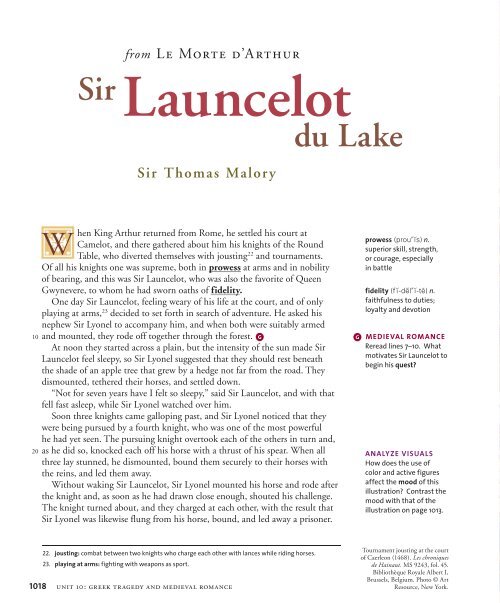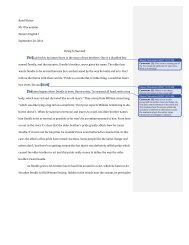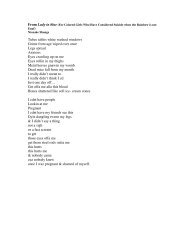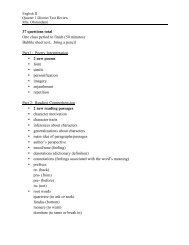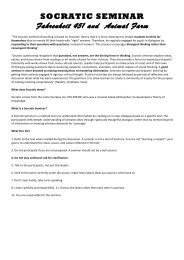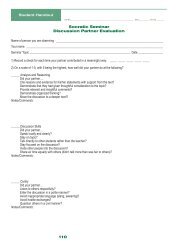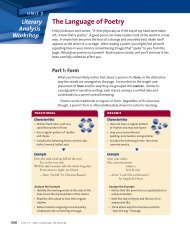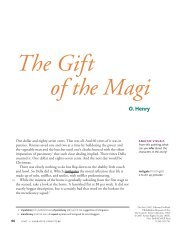Launcelot du Lake.pdf - LanguageArts-NHS
Launcelot du Lake.pdf - LanguageArts-NHS
Launcelot du Lake.pdf - LanguageArts-NHS
Create successful ePaper yourself
Turn your PDF publications into a flip-book with our unique Google optimized e-Paper software.
Sir<br />
22. jousting: combat between two knights who charge each other with lances while riding horses.<br />
23. playing at arms: fighting with weapons as sport.<br />
from Le Morte d’Arthur<br />
<strong>Launcelot</strong><br />
Sir Thomas Malory<br />
hen King Arthur returned from Rome, he settled his court at<br />
Camelot, and there gathered about him his knights of the Round<br />
Table, who diverted themselves with jousting22 and tournaments.<br />
Of all his knights one was supreme, both in prowess at arms and in nobility<br />
of bearing, and this was Sir <strong>Launcelot</strong>, who was also the favorite of Queen<br />
Gwynevere, to whom he had sworn oaths of fidelity.<br />
One day Sir <strong>Launcelot</strong>, feeling weary of his life at the court, and of only<br />
playing at arms, 23 W<br />
decided to set forth in search of adventure. He asked his<br />
nephew Sir Lyonel to accompany him, and when both were suitably armed<br />
10 and mounted, they rode off together through the forest. g<br />
At noon they started across a plain, but the intensity of the sun made Sir<br />
<strong>Launcelot</strong> feel sleepy, so Sir Lyonel suggested that they should rest beneath<br />
the shade of an apple tree that grew by a hedge not far from the road. They<br />
dismounted, tethered their horses, and settled down.<br />
“Not for seven years have I felt so sleepy,” said Sir <strong>Launcelot</strong>, and with that<br />
fell fast asleep, while Sir Lyonel watched over him.<br />
Soon three knights came galloping past, and Sir Lyonel noticed that they<br />
were being pursued by a fourth knight, who was one of the most powerful<br />
he had yet seen. The pursuing knight overtook each of the others in turn and,<br />
20 as he did so, knocked each off his horse with a thrust of his spear. When all<br />
three lay stunned, he dismounted, bound them securely to their horses with<br />
the reins, and led them away.<br />
Without waking Sir <strong>Launcelot</strong>, Sir Lyonel mounted his horse and rode after<br />
the knight and, as soon as he had drawn close enough, shouted his challenge.<br />
The knight turned about, and they charged at each other, with the result that<br />
Sir Lyonel was likewise flung from his horse, bound, and led away a prisoner.<br />
1018 unit 10: greek tragedy and medieval romance<br />
<strong>du</strong> <strong>Lake</strong><br />
prowess (prouPGs) n.<br />
superior skill, strength,<br />
or courage, especially<br />
in battle<br />
fidelity (fG-dDlPG-tC) n.<br />
faithfulness to <strong>du</strong>ties;<br />
loyalty and devotion<br />
g MEDIEVAL ROMANCE<br />
Reread lines 7–10. What<br />
motivates Sir <strong>Launcelot</strong> to<br />
begin his quest?<br />
ANALYZE VISUALS<br />
How does the use of<br />
color and active figures<br />
affect the mood of this<br />
illustration? Contrast the<br />
mood with that of the<br />
illustration on page 1013.<br />
Tournament jousting at the court<br />
of Caerleon (1468). Les chroniques<br />
de Hainaut. MS 9243, fol. 45.<br />
Bibliothèque Royale Albert I,<br />
Brussels, Belgium. Photo © Art<br />
Resource, New York.
30<br />
40<br />
50<br />
60<br />
The victorious knight, whose name was Sir Tarquine, 24 led his prisoners to<br />
his castle and there threw them on the ground, stripped them naked, and beat<br />
them with thorn twigs. After that he locked them in a <strong>du</strong>ngeon where many<br />
other prisoners, who had received like treatment, were complaining dismally.<br />
Meanwhile, Sir Ector de Marys, 25 who liked to accompany Sir <strong>Launcelot</strong> on<br />
his adventures, and finding him gone, decided to ride after him. Before long<br />
he came upon a forester.<br />
“My good fellow, if you know the forest hereabouts, could you tell me in<br />
which direction I am most likely to meet with adventure?”<br />
“Sir, I can tell you: less than a mile from here stands a well-moated castle.<br />
On the left of the entrance you will find a ford where you can water your<br />
horse, and across from the ford a large tree from which hang the shields of<br />
many famous knights. Below the shields hangs a caldron, of copper and<br />
brass: strike it three times with your spear, and then surely you will meet with<br />
adventure—such, indeed, that if you survive it, you will prove yourself the<br />
foremost knight in these parts for many years.”<br />
“May God reward you!” Sir Ector replied.<br />
The castle was exactly as the forester had described it, and among the shields<br />
Sir Ector recognized several as belonging to knights of the Round Table. After<br />
watering his horse, he knocked on the caldron, and Sir Tarquine, whose castle<br />
it was, appeared. h<br />
They jousted, and at the first encounter Sir Ector sent his opponent’s horse<br />
spinning twice about before he could recover.<br />
“That was a fine stroke; now let us try again,” said Sir Tarquine.<br />
This time Sir Tarquine caught Sir Ector just below the right arm and,<br />
having impaled him on his spear, lifted him clean out of the saddle and rode<br />
with him into the castle, where he threw him on the ground.<br />
“Sir,” said Sir Tarquine, “you have fought better than any knight I have<br />
encountered in the last twelve years; therefore, if you wish, I will demand no<br />
more of you than your parole 26 as my prisoner.”<br />
“Sir, that I will never give.”<br />
“Then I am sorry for you,” said Sir Tarquine, and with that he stripped and<br />
beat him and locked him in the <strong>du</strong>ngeon with the other prisoners. There Sir<br />
Ector saw Sir Lyonel. i<br />
“Alas, Sir Lyonel, we are in a sorry plight. But tell me, what has happened to<br />
Sir <strong>Launcelot</strong>? for he surely is the one knight who could save us.”<br />
“I left him sleeping beneath an apple tree, and what has befallen him since<br />
I do not know,” Sir Lyonel replied; and then all the unhappy prisoners once<br />
more bewailed their lot.<br />
24. Tarquine (tärPkwGn).<br />
25. Sir Ector de Marys (mBrPEs): the brother of <strong>Launcelot</strong>.<br />
26. parole: the promise of a prisoner to abide by certain conditions in exchange for full or partial freedom.<br />
1020 unit 10: greek tragedy and medieval romance<br />
h MEDIEVAL ROMANCE<br />
Reread lines 31–47, and<br />
think about the setting in<br />
which Sir Ector de Marys<br />
finds himself. What<br />
details suggest that this<br />
is an unusual or exotic<br />
place?<br />
i EVALUATE<br />
Consider Sir Tarquine’s<br />
behavior up to this<br />
point. Does he treat his<br />
opponents fairly both on<br />
and off the battlefield?<br />
Explain.
hile Sir <strong>Launcelot</strong> still slept beneath the apple tree, four queens<br />
started across the plain. They were riding white mules and<br />
accompanied by four knights who held above them, at the tips<br />
of their spears, a green silk canopy, to protect them from the sun. The party<br />
was startled by the neighing of Sir <strong>Launcelot</strong>’s horse and, changing direction,<br />
rode up to the apple tree, where they discovered the sleeping knight. And as<br />
each of the queens gazed at the handsome Sir <strong>Launcelot</strong>, so each wanted him<br />
for her own.<br />
“Let us not quarrel,” said Morgan le Fay. “Instead, I will cast a spell over<br />
him so that he remains asleep while we take him to my castle and make him<br />
our prisoner. We can then oblige him to choose one of us for his paramour.”<br />
Sir <strong>Launcelot</strong> was laid on his shield and borne by two of the knights to<br />
the Castle Charyot, which was Morgan le Fay’s stronghold. He awoke to find<br />
himself in a cold cell, where a young noblewoman was serving him supper.<br />
“What cheer?” 27 W<br />
70<br />
80<br />
she asked.<br />
“My lady, I hardly know, except that I must have been brought here by<br />
means of an enchantment.”<br />
“Sir, if you are the knight you appear to be, you will learn your fate at dawn<br />
tomorrow.” And with that the young noblewoman left him. Sir <strong>Launcelot</strong><br />
spent an uncomfortable night, but at dawn the four queens presented<br />
themselves and Morgan le Fay spoke to him:<br />
“Sir <strong>Launcelot</strong>, I know that Queen Gwynevere loves you, and you her. But<br />
now you are my prisoner, and you will have to choose: either to take one of us<br />
for your paramour, or to die miserably in this cell—just as you please. Now I<br />
90 will tell you who we are: I am Morgan le Fay, Queen of Gore; my companions<br />
are the queens of North Galys, of Estelonde, and of the Outer Isles. So make<br />
your choice.”<br />
“A hard choice! Understand that I choose none of you, lewd sorceresses that<br />
you are; rather will I die in this cell. But were I free, I would take pleasure in<br />
proving it against any who would champion you that Queen Gwynevere is the<br />
finest lady of this land.”<br />
“So, you refuse us?” asked Morgan le Fay.<br />
“On my life, I do,” Sir <strong>Launcelot</strong> said finally, and so the queens departed. j<br />
Sometime later, the young noblewoman who had served Sir <strong>Launcelot</strong>’s<br />
100 supper reappeared.<br />
“What news?” she asked.<br />
“It is the end,” Sir <strong>Launcelot</strong> replied.<br />
“Sir <strong>Launcelot</strong>, I know that you have refused the four queens, and that they<br />
wish to kill you out of spite. But if you will be ruled by me, I can save you. I<br />
ask that you will champion my father at a tournament next Tuesday, when he<br />
has to combat the King of North Galys, and three knights of the Round Table,<br />
who last Tuesday defeated him ignominiously.”<br />
“My lady, pray tell me, what is your father’s name?”<br />
27. What cheer?: How are you?<br />
j EVALUATE<br />
Reread lines 87–98. What<br />
does <strong>Launcelot</strong>’s response<br />
to the ultima tum of the<br />
four queens reveal about<br />
his character?<br />
ignominiously<br />
(GgQnE-mGnPC-Es-lC) adv.<br />
shamefully<br />
le morte d’arthur 1021
110<br />
120<br />
130<br />
140<br />
“King Bagdemagus.” 28<br />
“Excellent, my lady; I know him for a good king and a true knight, so I shall<br />
be happy to serve him.”<br />
“May God reward you! And tomorrow at dawn I will release you and direct<br />
you to an abbey 29 which is ten miles from here, and where the good monks<br />
will care for you while I fetch my father.”<br />
“I am at your service, my lady.”<br />
As promised, the young noblewoman released Sir <strong>Launcelot</strong> at dawn. When<br />
she had led him through the twelve doors to the castle entrance, she gave him<br />
his horse and armor, and directions for finding the abbey.<br />
“God bless you, my lady; and when the time comes, I promise I shall not<br />
fail you.” k<br />
Sir <strong>Launcelot</strong> rode through the forest in search of the abbey but at <strong>du</strong>sk<br />
had still failed to find it and, coming upon a red silk pavilion, apparently<br />
unoccupied, decided to rest there overnight and continue his search in the<br />
morning.<br />
He had not been asleep for more than an hour, however, when the knight<br />
who owned the pavilion returned and got straight into bed with him. Having<br />
made an assignation 30 with his paramour, the knight supposed at first that<br />
Sir <strong>Launcelot</strong> was she and, taking him into his arms, started kissing him. Sir<br />
<strong>Launcelot</strong> awoke with a start and, seizing his sword, leaped out of bed and out<br />
of the pavilion, pursued closely by the other knight. Once in the open they set<br />
to with their swords, and before long Sir <strong>Launcelot</strong> had wounded his unknown<br />
adversary so seriously that he was obliged to yield.<br />
The knight, whose name was Sir Belleus, now asked Sir <strong>Launcelot</strong> how he<br />
came to be sleeping in his bed and then explained how he had an assignation<br />
with his lover, adding:<br />
“But now I am so sorely wounded that I shall consider myself fortunate to<br />
escape with my life.”<br />
“Sir, please forgive me for wounding you; but lately I escaped from an<br />
enchantment, and I was afraid that once more I had been betrayed. Let us go<br />
into the pavilion, and I will staunch your wound.” l<br />
Sir <strong>Launcelot</strong> had just finished binding the wound when the young<br />
noblewoman who was Sir Belleus’s paramour arrived and, seeing the wound,<br />
at once rounded in fury on Sir <strong>Launcelot</strong>.<br />
“Peace, my love,” said Sir Belleus. “This is a noble knight, and as soon as I<br />
yielded to him, he treated my wound with the greatest care.” Sir Belleus then<br />
described the events which had led up to the <strong>du</strong>el.<br />
“Sir, pray tell me your name, and whose knight you are,” the young<br />
noblewoman asked Sir <strong>Launcelot</strong>.<br />
“My lady, I am called Sir <strong>Launcelot</strong> <strong>du</strong> <strong>Lake</strong>.”<br />
28. Bagdemagus (bBgPdE-mBgQEs).<br />
29. abbey: a place where monks or nuns live.<br />
30. assignation (BsQGg-nAPshEn): an appointment for a meeting between lovers.<br />
1022 unit 10: greek tragedy and medieval romance<br />
k MEDIEVAL ROMANCE<br />
Review the exchange<br />
between Sir <strong>Launcelot</strong><br />
and the noblewoman<br />
in lines 99–120. Why<br />
might they be considered<br />
idealized characters?<br />
adversary (BdPvEr-sDrQC)<br />
n. an opponent; enemy<br />
l MEDIEVAL ROMANCE<br />
Hidden identity is a<br />
common element in<br />
romances. Compare the<br />
scene in lines 121–140<br />
with the scene in lines<br />
40–56 on page 1014.<br />
What different effects do<br />
these scenes create?
150<br />
160<br />
Combat between Lancelot and Gawain (1400s) from the Cycle de Lancelot. MS Fr. 120, f. 590v.107a. Bibliothèque<br />
Nationale de France, Paris. Photo © Bibliothèque Nationale de France, Paris.<br />
“As I guessed, both from your appearance and from your speech; and<br />
indeed I know you better than you realize. But I ask you, in recompense for<br />
the injury you have done my lord, and out of the courtesy for which you are<br />
famous, to recommend Sir Belleus to King Arthur, and suggest that he be<br />
made one of the knights of the Round Table. I can assure you that my lord<br />
deserves it, being only less than yourself as a man-at-arms, and sovereign of<br />
many of the Outer Isles.”<br />
“My lady, let Sir Belleus come to Arthur’s court at the next Pentecost. 31 Make<br />
sure that you come with him, and I promise I will do what I can for him; and if<br />
he is as good a man-at-arms as you say he is, I am sure Arthur will accept him.”<br />
As soon as it was daylight, Sir <strong>Launcelot</strong> armed, mounted, and rode away in<br />
search of the abbey, which he found in less than two hours. King Bagdemagus’s<br />
daughter was waiting for him and, as soon as she heard his horse’s footsteps in<br />
the yard, ran to the window and, seeing that it was Sir <strong>Launcelot</strong>, herself ordered<br />
the servants to stable his horse. She then led him to her chamber, disarmed him,<br />
and gave him a long gown to wear, welcoming him warmly as she did so.<br />
31. Pentecost: In Arthurian legend, Pentecost is one of the times at which the knights meet at Camelot to<br />
renew their oaths and receive new missions.<br />
recompense<br />
(rDkPEm-pDnsQ) n. amends<br />
for damage or payment<br />
for service<br />
le morte d’arthur 1023
170<br />
180<br />
190<br />
200<br />
K<br />
ing Bagdemagus’s castle was twelve miles away, and his daughter sent<br />
for him as soon as she had settled Sir <strong>Launcelot</strong>. The king arrived<br />
with his retinue 32 and embraced Sir <strong>Launcelot</strong>, who then described his<br />
recent enchantment, and the great obligation he was under to his daughter for<br />
releasing him.<br />
“Sir, you will fight for me on Tuesday next?”<br />
“Sire, I shall not fail you; but please tell me the names of the three Round<br />
Table knights whom I shall be fighting.”<br />
“Sir Modred, Sir Madore de la Porte, and Sir Gahalantyne. I must admit<br />
that last Tuesday they defeated me and my knights completely.”<br />
“Sire, I hear that the tournament is to be fought within three miles of the<br />
abbey. Could you send me three of your most trustworthy knights, clad in<br />
plain armor, and with no device, 33 and a fourth suit of armor which I myself<br />
shall wear? We will take up our position just outside the tournament field and<br />
watch while you and the King of North Galys enter into combat with your<br />
followers; and then, as soon as you are in difficulties, we will come to your<br />
rescue and show your opponents what kind of knights you command.”<br />
This was arranged on Sunday, and on the following Tuesday Sir <strong>Launcelot</strong><br />
and the three knights of King Bagdemagus waited in a copse, 34 not far from<br />
the pavilion which had been erected for the lords and ladies who were to judge<br />
the tournament and award the prizes.<br />
The King of North Galys was the first on the field, with a company of<br />
ninescore knights; he was followed by King Bagdemagus with fourscore 35<br />
knights, and then by the three knights of the Round Table, who remained<br />
apart from both companies. At the first encounter King Bagdemagus lost<br />
twelve knights, all killed, and the King of North Galys six.<br />
With that, Sir <strong>Launcelot</strong> galloped on to the field, and with his first spear<br />
unhorsed five of the King of North Galys’s knights, breaking the backs of four<br />
of them. With his next spear he charged the king and wounded him deeply in<br />
the thigh.<br />
“That was a shrewd blow,” commented Sir Madore and galloped onto the<br />
field to challenge Sir <strong>Launcelot</strong>. But he too was tumbled from his horse, and<br />
with such violence that his shoulder was broken.<br />
Sir Modred was the next to challenge Sir <strong>Launcelot</strong>, and he was sent<br />
spinning over his horse’s tail. He landed headfirst, his helmet became buried<br />
in the soil, and he nearly broke his neck, and for a long time lay stunned.<br />
Finally Sir Gahalantyne tried; at the first encounter both he and Sir <strong>Launcelot</strong><br />
broke their spears, so both drew their swords and hacked vehemently at each<br />
other. But Sir <strong>Launcelot</strong>, with mounting wrath, soon struck his opponent a<br />
blow on the helmet which brought the blood streaming from eyes, ears, and<br />
32. retinue (rDtPn-LQ): attendants.<br />
33. device: an emblem or design used as an identifying mark.<br />
34. copse (kJps): a thicket of small trees.<br />
35. ninescore . . . fourscore: A score is a set of 20; thus, ninescore is 180 and fourscore is 80.<br />
1024 unit 10: greek tragedy and medieval romance
210<br />
220<br />
230<br />
240<br />
mouth. Sir Gahalantyne slumped forward in the saddle, his horse panicked, and<br />
he was thrown to the ground, useless for further combat.<br />
Sir <strong>Launcelot</strong> took another spear and unhorsed sixteen more of the King of<br />
North Galys’s knights and, with his next, unhorsed another twelve; and in each<br />
case with such violence that none of the knights ever fully recovered. The King<br />
of North Galys was forced to admit defeat, and the prize was awarded to King<br />
Bagdemagus. m<br />
That night Sir <strong>Launcelot</strong> was entertained as the guest of honor by King<br />
Bagdemagus and his daughter at their castle and before leaving was loaded<br />
with gifts.<br />
“My lady, please, if ever again you should need my services, remember that I<br />
shall not fail you.”<br />
The next day Sir <strong>Launcelot</strong> rode once more through the forest and by<br />
chance came to the apple tree where he had previously slept. This time he met<br />
a young noblewoman riding a white palfrey. 36<br />
“My lady, I am riding in search of adventure; pray tell me if you know of<br />
any I might find hereabouts.”<br />
“Sir, there are adventures hereabouts if you believe that you are equal to<br />
them; but please tell me, what is your name?”<br />
“Sir <strong>Launcelot</strong> <strong>du</strong> <strong>Lake</strong>.”<br />
“Very well, Sir <strong>Launcelot</strong>, you appear to be a sturdy enough knight, so I<br />
will tell you. Not far away stands the castle of Sir Tarquine, a knight who in<br />
fair combat has overcome more than sixty opponents whom he now holds<br />
prisoner. Many are from the court of King Arthur, and if you can rescue them,<br />
I will then ask you to deliver me and my companions from a knight who<br />
distresses us daily, either by robbery or by other kinds of outrage.”<br />
“My lady, please first lead me to Sir Tarquine; then I will most happily<br />
challenge this miscreant knight of yours.”<br />
When they arrived at the castle, Sir <strong>Launcelot</strong> watered his horse at the ford<br />
and then beat the caldron until the bottom fell out. However, none came to<br />
answer the challenge, so they waited by the castle gate for half an hour or so.<br />
Then Sir Tarquine appeared, riding toward the castle with a wounded prisoner<br />
slung over his horse, whom Sir <strong>Launcelot</strong> recognized as Sir Gaheris, Sir<br />
Gawain’s brother and a knight of the Round Table.<br />
“Good knight,” said Sir <strong>Launcelot</strong>, “it is known to me that you have put to<br />
shame many of the knights of the Round Table. Pray allow your prisoner, who<br />
I see is wounded, to recover, while I vindicate the honor of the knights whom<br />
you have defeated.”<br />
“I defy you, and all your fellowship of the Round Table,” Sir Tarquine replied.<br />
“You boast!” said Sir <strong>Launcelot</strong>.<br />
At the first charge the backs of the horses were broken and both knights<br />
stunned. But they soon recovered and set to with their swords, and both struck<br />
so lustily that neither shield nor armor could resist, and within two hours they<br />
36. palfrey: a gentle riding-horse.<br />
m EVALUATE<br />
Reread lines 192–212.<br />
Which aspects of the<br />
chivalric code does Sir<br />
<strong>Launcelot</strong> uphold in<br />
his performance at the<br />
jousting tournament?<br />
vindicate (vGnPdG-kAtQ)<br />
v. to clear of suspicion,<br />
doubt, or blame<br />
le morte d’arthur 1025
250<br />
260<br />
270<br />
280<br />
were cutting each other’s flesh, from which the blood flowed liberally. Finally<br />
they paused for a moment, resting on their shields.<br />
“Worthy knight,” said Sir Tarquine, “pray hold your hand for a while and, if<br />
you will, answer my question.”<br />
“Sir, speak on.”<br />
“You are the most powerful knight I have fought yet, but I fear you may be<br />
the one whom in the whole world I most hate. If you are not, for the love of<br />
you I will release all my prisoners and swear eternal friendship.”<br />
“What is the name of the knight you hate above all others?”<br />
“Sir <strong>Launcelot</strong> <strong>du</strong> <strong>Lake</strong>; for it was he who slew my brother, Sir Carados<br />
of the Dolorous Tower, and it is because of him that I have killed a hundred<br />
knights and maimed as many more, apart from the sixty-four I still hold<br />
prisoner. And so, if you are Sir <strong>Launcelot</strong>, speak up, for we must then fight<br />
to the death.”<br />
“Sir, I see now that I might go in peace and good fellowship or otherwise<br />
fight to the death; but being the knight I am, I must tell you: I am Sir<br />
<strong>Launcelot</strong> <strong>du</strong> <strong>Lake</strong>, son of King Ban of Benwick, of Arthur’s court, and a<br />
knight of the Round Table. So defend yourself!”<br />
“Ah! this is most welcome.”<br />
Now the two knights hurled themselves at each other like two wild bulls;<br />
swords and shields clashed together, and often their swords drove into the<br />
flesh. Then sometimes one, sometimes the other, would stagger and fall, only<br />
to recover immediately and resume the contest. At last, however, Sir Tarquine<br />
grew faint and unwittingly lowered his shield. Sir <strong>Launcelot</strong> was swift to<br />
follow up his advantage and, dragging the other down to his knees, unlaced his<br />
helmet and beheaded him. n<br />
Sir <strong>Launcelot</strong> then strode over to the young noblewoman: “My lady, now I<br />
am at your service, but first I must find a horse.”<br />
Then the wounded Sir Gaheris spoke up: “Sir, please take my horse. Today<br />
you have overcome the most formidable knight, excepting only yourself, and<br />
by so doing have saved us all. But before leaving, please tell me your name.”<br />
“Sir <strong>Launcelot</strong> <strong>du</strong> <strong>Lake</strong>. Today I have fought to vindicate the honor of the<br />
knights of the Round Table, and I know that among Sir Tarquine’s prisoners<br />
are two of my brethren, Sir Lyonel and Sir Ector, also your own brother, Sir<br />
Gawain. According to the shields there are also Sir Brandiles, Sir Galyhuddis, 37<br />
Sir Kay, Sir Aly<strong>du</strong>kis, 38 Sir Marhaus, and many others. Please release the<br />
prisoners and ask them to help themselves to the castle treasure. Give them all<br />
my greetings and say I will see them at the next Pentecost. And please request<br />
Sir Ector and Sir Lyonel to go straight to the court and await me there.” <br />
37. Galyhuddis (gBlPG-hMdQEs).<br />
38. Aly<strong>du</strong>kis (BlPG-dLQkEs).<br />
1026 unit 10: greek tragedy and medieval romance<br />
n MEDIEVAL ROMANCE<br />
Reread lines 246–274.<br />
Which details suggest<br />
that the clash between<br />
Sir Tarquine and Sir<br />
<strong>Launcelot</strong> is exaggerated<br />
or larger than life?


